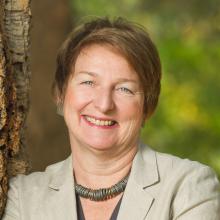
Resilience: A 2020 Perspective
International educators must continually innovate, especially when faced with change
This piece originally appeared in NAFSA's International Educator Magazine.
By Joanna Regulska, Vice Provost and Dean of Global Affairs
As international educators, we must be visionary strategists, steady implementers, and innovative collaborators—especially in the face of change. During the COVID-19 pandemic, we have faced multifaceted challenges while also being reminded of how interconnected our world is and how critical global engagement is, not only for higher and international education, but for the future of this planet.
We have a responsibility to rethink our approaches as we advance our university missions and prepare our students to succeed through innovation, creativity, and leadership. In looking at what it means to be an international educator through the lens of resilience, change, and innovation, we focused on the following three areas at my institution, the University of California, Davis (UC Davis), which may help you direct efforts at your own institution.
Eradicate Inequalities
Universities have important roles in eradicating inequalities related to gender, sexual orientation, race, ability, social or economic status, and more, especially as inequalities have been exacerbated by the pandemic. Partnerships across campus departments can build momentum in these areas.

In Global Affairs at UC Davis, we partner with the Office of Diversity, Equity, and Inclusion, as well as the Office of Sustainability, to advance the United Nations Sustainable Development Goals (SDGs). We are creating a community of practice through SDG forums and providing SDG internships for students and SDG grants for faculty. This year, we expanded these SDG grants to include one for teams working on goal number 10: Reduce inequality within and among countries. Two more grants are for teams focused on advancing multicultural perspectives and expanding the presence of women and underrepresented faculty in science, social sciences, the arts, and humanities.
In addition, this summer we secured funding through Universitas 21 to provide a more robust global classroom model for teaching and learning about the SDGs, partnering with Tecnológico de Monterrey in Mexico and Shanghai Jiao Tong University in China. These projects focus on a combination of virtual, hybrid, and in-person collaboration.
We have a responsibility to rethink our approaches as we advance our university missions and prepare our students to succeed through innovation, creativity, and leadership.
Listen to—and Act on—Student Feedback
At UC Davis, we have a goal called Global Education for All, which aims to provide 100 percent of students with global learning experiences—whether on campus, in the region, or across all seven continents. The pandemic has accelerated this goal to provide more accessible opportunities, especially those tailored to meet diverse student needs. Based on student feedback, we know there is strong interest from students in gaining the global skills, knowledge, perspectives, and networks that prepare them for an interconnected world and global job market. We also know students want to work alongside communities across cultural and geographic boundaries to make a positive impact.
Through our Global Learning Hub, we are expanding opportunities that build these capacities, including global remote internships and professional and leadership development. These opportunities are available now and will continue in the future, given that international travel will always be a barrier for many students.
For example, this summer we supported UC Davis students as interns with an organization called Team4Tech, during which they worked remotely with colleagues in Kenya, Malawi, and Rwanda. During their final internship presentations, students discussed international collaborations, cross-cultural team building, time management across time zones, and possible career paths. We also heard from some students who would not have been able do this global internship if not for it being available virtually. Given this early success, in addition to continuing these partnerships, we have developed 13 UC Davis offerings across seven tracks for virtual global internships for summer 2021.
Communicate, Communicate, Communicate
Especially as we navigate change, it is essential to keep our audiences well-informed and provide a sense of community. We have global affairs communications strategies so we can reach our audiences with useful information and opportunities, while telling our overall global story. During the pandemic, we increased the frequency of newsletters and messages and developed web resources, such as search tools for students to connect with remote global learning opportunities, a webpage for faculty to locate remote global teaching resources, and information for international students and scholars to find online community programs from wherever they are across the globe to strengthen their sense of belonging to UC Davis.
As global and international offices continue to provide specialized programs and services, our readiness to work across the campus and world on new possibilities and new collaborations sets us up to continue providing value.
We’re also committed to continuing to connect our campus community with the world and to raising the visibility of our university internationally. Through our new online global conversations series, we’re bringing together experts across fields for public discussions on timely global topics, including those related to the SDGs. Likewise, through our new online global career development series, we’re facilitating frequent panels and workshops for students on career development and global opportunities after graduation. The remote environment actually allows for more connection and greater reach; combined with other new online series and events in 2020, we’ve reached nearly 3,000 attendees across more than 70 countries.
Staying Committed and Innovative
Throughout these areas of focus, there is always the need to be strategic in advancing the university mission, while being innovative and flexible in our approaches. The pandemic has reinforced our UC Davis commitment to global learning, research, and mutually beneficial and transformative partnerships, but it has changed the ways in which this takes place. As global and international offices continue to provide specialized programs and services, our readiness to work across the campus and world on new possibilities and new collaborations sets us up to continue providing value.
Read the full article at NAFSA's International Educator Magazine.